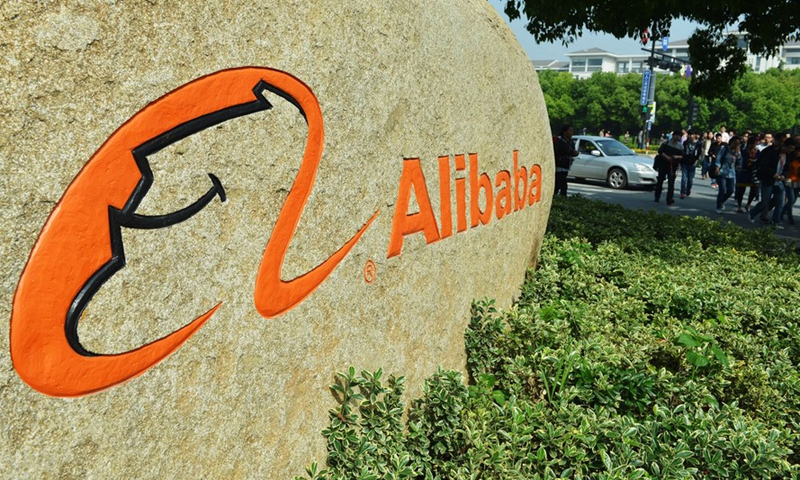Alibaba plans dual primary listing in HK to attract more investors
Other Chinese firms may follow suit amid US crackdown: experts

File photo shows the Alibaba employees entering the company in Hangzhou, Zhejiang Province.Photo:Xinhua
Alibaba Group said on Tuesday that it will upgrade its secondary listing on the Hong Kong Stock Exchange (HKSE) to a primary one under a new exchange procedure that allows dual primary listings, paving the way for attracting more investment from the Chinese mainland through stock connect programs.
Alibaba's move offers a sign that more US-listed Chinese companies could seek similar listings on the HKSE, as they cope with rising political risks amid the US' crackdown on Chinese firms, including seeking to delist Chinese companies from US exchanges, experts noted.
"We have received approval from the board to apply to add Hong Kong as another primary listing venue, in the hopes of fostering a wider and more diversified investor base to share in Alibaba's growth and future, especially from China and other markets in Asia," Alibaba Group Chairman and CEO Daniel Zhang Yong said in a press release.
Alibaba said that it aims to finish the primary listing process by the end of 2022. The group's shares are already traded both on the New York Stock Exchange and the HKSE, but its listing in Hong Kong is a secondary one.
The HKSE recently changed rules, making it easier for more firms to get dual primary listings in the city, and Alibaba is the first major company to take advantage of this change, according to a Reuters report.
A primary listing in Hong Kong means that Alibaba's shares could be included the Shenzhen-Hong Kong Stock Connect, which could be a stable funding channel from Chinese mainland investors that provides an effective cushion for Alibaba if the US intensifies its crackdown on Chinese stocks trading in the US, experts noted.
Pursuing a primary listing on the Hong Kong stock exchange will increase the value of Alibaba shares traded in Hong Kong, while relatively reducing Alibaba's market capitalization in the US to achieve a balance between the two markets, experts said.
The advantage of a dual listing is that if the financing environment in one market deteriorates, the company could calmly exit and make full use of the financing resources in the other market, Dong Shaopeng, a senior research fellow at the Chongyang Institute for Financial Studies at Renmin University of China, told the Global Times on Tuesday.
"With this initiative at hand, Chinese companies could afford to forgo their listing status in the US if necessary," he said.
Dong Dengxin, director of the Finance and Securities Institute of the Wuhan University of Science and Technology, also said that "if the US forces Alibaba to delist, it could convert all its US shares into Hong Kong shares at once, offering protection for international investors and for Alibaba itself."
Dong Dengxin noted that Alibaba's dual-primary listing could be an example for other large internet companies such as JD.com, Pinduoduo and Baidu.
Due to extreme anti-China political sentiment, the US has launched geopolitical containment and trade crackdown measures against China in recent years, with the threat of delisting US-listed Chinese companies being a longstanding threat. The US Securities and Exchange Commission has put more than 100 US-listed Chinese companies on the so-called provisional list for possible delisting.
The US' push to "decouple" from China brings monumental political risks for US-listed Chinese mainland firms, and Hong Kong hopes to adjust some stock market rules to make it more convenient for these companies to shift their listings, Hong Kong Special Administrative Region (HKSAR) Financial Secretary Paul Chan Mo-po said in a recent interview with the Global Times.
Chan said that more than 20 US-listed mainland companies had shifted to Hong Kong, accounting for over 70 percent of the total capitalization of Chinese mainland firms trading in the US.
The listing of new economy companies in Hong Kong will inject vitality into the stock market, Chan said, noting that the HKSAR government is mulling more steps to make such shifts convenient.
So far, at least nine US-listed Chinese companies, including Zhihu, KE Holdings, XPeng and Li Auto, have completed dual listings in Hong Kong, according to media reports.
While the HKSAR remains a top choice as the new home for US-listed Chinese firms, Chinese regulators are also encouraging firms to get listed overseas to attract global capital.
In February, the China Securities Regulatory Commission revised provisions of the Stock Connect program between domestic and overseas stock exchanges to expand its scope from Shanghai and London to include the Shenzhen Stock Exchange, along with exchanges in Switzerland and Germany.

